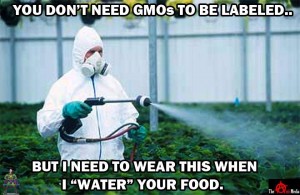I am not very involved in politics, and am happy, not paying attention to every last political debate and issue. But one issue that I’ve been watching and have concerned about for years is the safety of GMO’s.
GMO stands for Genetically Modified Organism. “These are plant or meat products that have had their DNA artificially altered by genes from other plants, animals, viruses, or bacteria, in order to produce foreign compounds in that food. These genetic alterations occur in a laboratory and are not found in nature.”
There are multiple issues surrounding GMO’s, but I’m going highlight two of the main concerns I have especially as a mother and a cancer survivor, concerned with my health and the health of my two growing boys, ages 10 and 8.
The first issue is I am concerned about with GMO’s, is they have never been, and are not currently tested for effects (short term and long term) on humans, by the FDA before human consumption. How can something lab created, which has never been consumed by humans before, be put in our food supply, with absolutely no testing on their safety?
We are told by the FDA and the companies that create them, that GMO’s are safe with no harmful side effects, but how is this proven? Where is the proof that after 5 years, 10 years, 20 years, GMO’s won’t harm infants, children, or adults? We are told they are safe, but scientists developing them have to wear protective suits, to even distribute the chemicals on their GMO crops, they say are safe for us to eat. What kind of science is that? Why aren’t studies done first to test this food before telling consumers it is safe, and using it in production of our food? You may have seen this floating around from time to time in regards to GMO’s and I think it sums up this concern perfectly.
A second issue of concern I have are GMO’s are not produced by local farmers, or farmer co-ops, experimenting with crops, at a local level, like in the past, but by billion dollar chemical companies. The largest GMO producer is Monsanto, the producer of toxic herbicide, Round Up. Yes, the chemical that annihilates weeds- that is the corporation who is producing close to 90% of the GMO seeds in the WORLD.
Montsanto’s GMO’s are not designed to increase food production. The world has always been able to produce enough crops. Many experts agree, hunger is an economic and food distribution problem. There is not conclusive evidence showing that GMO’s solves the issues of hunger or poverty.
But GMO’s do make Montsanto an enormous amount of profit. How? Montsanto sells their pricey seeds to farmers, who are required to sign contracts to keep buying seeds year after year. As the crops become more herbicide resistant, Montsanto profits by having more farmers who have to buy more chemicals- namely Round Up. Meanwhile the farmer is caught in a vicious cycle now.
These GMO’s can be easily spread and interbred with other organisms, which can’t be undone. This can include cross pollination with other crops, and PropToxins that are used in GMO’s to make them resistant, have shown up in humans and in unborn fetuses. I live on the border of Boulder County, CO which has banned GMO crops, as has Burlington, VT. North Dakota, Montana, and Vermont also bans GMO wheat for some of these reasons.
Sixty two countries around the world, including the entire European Union, China, Japan, Australia, (to name a few) have banned GMO’s or require labeling. The United States is the only developed country in the world that does not require labeling of GMO foods.
In 1996 when Montsanto started selling its Round Up Ready soybeans, only 2% of the soybeans in the US contained their patented gene. By 2008 over 90% of the soybeans in the US contained the Montsanto gene.
Montsanto also produces (but later sold to a division of Eli Lilly) the rBGH dairy growth hormone that has been banned and pledged by suppliers not to use on their cows, because of concerns of safety. It’s not banned by the FDA (why is that not surprising either?), but consumers have largely rejected this, and many retailers like Kroger, Safeway, Costco, others and even Wal-Mart ban and prohibit it from their suppliers. If you looked at your milk right now, in the fridge it says something like “Produced without artificial growth hormone rBST.” This message is brought to you courtesy of Montsanto, and their pushing an unproven chemical with the FDA’s approval, into our milk supply.
Did you notice though, because the consumers rejected this from Montsanto, it never became the standard for injecting cows that produce our milk with this hormone? In fact, producers are now eager to tell us their milk doesn’t contain rBST. I mention this to show the history of Montsanto and the FDA has not been to produce safe chemicals, to boost the world’s food supply, but to get their untested, and questionable at best, chemicals out to the market place, to make more and more money. Hard to believe! (insert sarcasm). It also shows that we, the consumers, have a huge voice and say, in how our food gets produced, and presented to us!
I am not a scientist by any means, but with this history and background it doesn’t take a scientist to know that the FDA or businesses do not always look out for the consumer’s best interests. Companies like Montsanto are not looking out for our health- they are looking out for their bottom line, with no regard to our health or farming. Montsanto’s profit in 2013 was 2.4 billion dollars!
I’m not opposed at all to a company making money, as long as they are not harming people and putting our health in jeopardy. It seems to me that Montsanto does everything to make a profit BUT take our health or possible health risks into account with their GMO’s. That is what I have an issue with. Our health should not be sacrificed or even be put in the slightest risk, so a corporation can make another billion dollars. All while fighting regulation to label their GMO’s, while the FDA does not require safety tests, before GMO’s are in our food supply. It leaves more questions than answers in my mind, such as, why does every other major country in the world ban GMO’s or require labeling if they are so “safe?”
A toxic chemical billion dollar company, altering and manipulating plant genes, producing food, never studied on humans, but touted to the public consumer as safe? No thank you. I personally don’t trust it, feel it is safe, and neither does the majority of the developed world. I think there should be labeling of GMO’s as a very basic standard, so people can choose for themselves what kind of food they are eating.
That brings me to the next part of this post, in Colorado on our November ballot, we will have a chance to vote on Colorado Mandatory Labeling of GMOs Initiative, Proposition 105. The measure would require any “prepackaged, processed food or raw agricultural commodity that has been produced using genetic modification” to include the label: “Produced with genetic engineering.” If approved, the law would be put into effect by January 1, 2016.
Obviously, I think labeling of GMO’s are needed. I want to know if the food I am eating and feeding to my children contain GMO’s. Organic food in the United States, should not contain any GMO’s at all, according to standards, or it can’t be labeled organic. But eating 100% organic food all the time, is not realistic or practical. Some conventional foods are not produced with GMO’s, and I feel we should have the knowledge and choice by labeling GMO’s to decide for ourselves and our families.
Millions of dollars are being spent in Colorado and Oregon (where it is on the ballot in November as well, as Measure 92) to defeat this from becoming law. Why? If GMO’s are so safe, then why are companies like Monsanto, who produce the majority of GMO’s and deem them safe for us all, are spending millions to defeat these ballot initiatives? In fact, Montsanto has spent almost 10 million dollars in Colorado and Washington, just in this election season, trying to defeat these from becoming law. They have spent millions more in previous elections in other states, with similar ballot initiatives. How much food could 10 million plus dollars buy for the world’s hungry? Yet, they feel this money should be spent keeping consumers in the dark, if our food contains their GMO’s. Why?
If you scroll down on the Colorado Mandatory Labeling link I posted a few paragraphs above, they list companies that support and oppose Proposition 105. But you probably can guess what companies are on this list, and what companies aren’t, without even looking. Hint- local, organic, smaller farmers, grocery chains and businesses who support it; big businesses, and big farming corporations, who oppose it (funded with Monsanto’s millions).
If GMO’s are safe, pose no health risks, and labeling is already required in all the other countries these corporations do business in, then what is the big deal if a few states in the United States, make GMO labeling mandatory? Is this really worth spending millions of dollars to defeat in Colorado and Washington? Obviously that answer is resounding yes, from the very companies and producers of GMO’s themselves. And again, I ask why?
I hope if you are undecided on this issue, you will look into it more before you vote, if you live in Colorado or Washington. I think it is important we hold these companies and the FDA accountable. There should be a very basic standard on all food produced, and that is to label what is in the food for the consumer. We are all capable of deciding for ourselves if we are willing to gamble with our health, by being guinea pigs to billion dollar chemical corporations’ “safe” GMO’s. We all have a right to know what is in our food.
I will be voting YES for GMO’s to be labeled in Colorado. I’m not willing to risk my health or the health of my children, by just taking a “good ole” billion dollar chemical company’s word that GMO’s are safe. I want to know what is in my food I’m buying for my family. It matters how our food is produced. Evidently, Monsanto and the big corporations think so too- otherwise they would not be spending millions of dollars opposing the measure, giving consumers the choice to decide. Actions speak louder than words.

